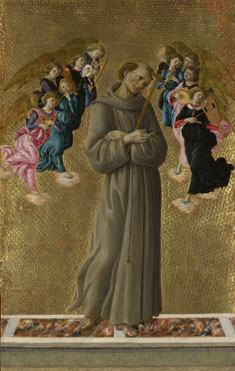Today the Church celebrates the feast of St. Francis of Assisi, arguably the most well loved Saint in the Church, a person admired by Christian and non-Christian alike. The stereotypcial Francis is that of a anti-urbanite hippie who traipsed through the countryside as a proto-environmentalist, communing with all of nature, flora and fauna alike. The stereotype of Francis the nature-lover often prevents us from inquiring as to the rationale behind this seeming unique trait. Such an inquiry would actually deepen our appreciation for the specifically theological significance of St. Francis.
In the Platonic philosophy of the medieval doctor of the Church St. Bonaventure (summarised masterfully in Ilia Delio's
Simply Bonaventure), every creature is marked with the Word of God, which John's Gospel says has been existing before the world began, and through through which all things came into being. This Word in creation in every stage of history is drawing every creature back to the God who created it, and every creature is drawn back to God by following what Bonaventure calls "exemplars" or models of perfection. Christ as the incarnate Word, fully divine and human at the same time, stands as the exemplar
par excellence for all creatures.
For St. Bonaventure, St. Francis of Assisi has a special place among the Saint because of his perfect imitation of Christ, so perfect that he becomes transformed into a historical image of Christ the Word. This had two immediate physical implications. Because of his perfect union with the Word/Christ, he was also in perfect harmony with the Word in every creature, hence the ability of Francis to commune not only with animals, but everything in the cosmos. Also, because of his intimate union with the incarnate Word, he also bears the physical traits of the incarnate Word, namely the wounds of Christ or stigmata.
But going further still, Bonaventure draws our attention to another implication of Francis' union with Christ. If Christ, as stated in an
earlier post, heralds an folding of a New Eden (an eschatological condition which comes to completion at the end of all history), then Francis' union with Christ makes the Saint an eschatological figure. Bonaventure believed that like Christ, Francis also brought the
eschaton back into history, well before its consummation. The inbreaking of the
eschaton into history heralded what Bonaventure called a "Seraphic Order" or "Order of Angels". Francis thus stands as a reminder that, in Christ the incarnate word, the New Eden is already present among us.
Nevertheless, Christians should not kid themselves that this somehow automatically gives them some special status among creation, relinquishing them of any need for an active striving after perfection. Bonaventure also implied in his writings that it was through the wounds of Christ, imprinted on Francis, that acted as the portals through which this eschatological "Seraphic Order" could enter history. Francis union with Christ was that of a union with a Crucified Christ, and as such the "Seraphic Order" could not be realised in history without the Suffering Body of Christ. Christians bring about the eschaton then, not through conquest or bureaucratic manipulation, but by suffering, and uniting that suffering with the suffering of the Crucified Christ.
This mode of eschatological living is not the preserve of mystics like Francis, but for everyone. This explains why, in explaining what it meant to be perfect, Bonaventure wrote in a letter:
Your heart is the altar of God...You are to feed it everyday with the wood of the cross of Christ...let your love lead your steps to Jesus wounded, to Jesus crowned with thorns...there transformed into Christ by your burning love for the Crucified...
Labels: books, discipleship, politics, resources, Saints
